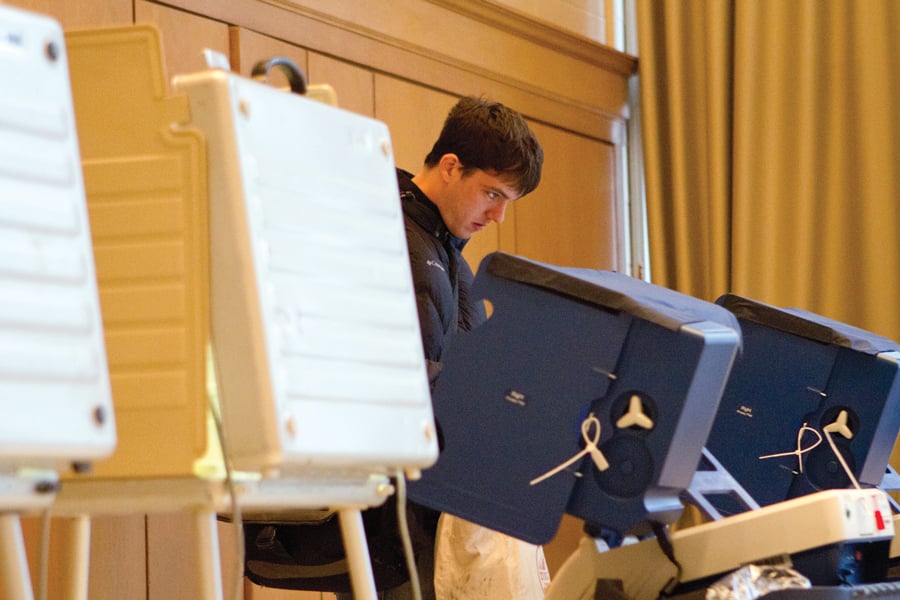A student’s guide to the 2020 Democratic primaries
Daily file photo by Meghan White
A student votes in the 2012 presidential election.
January 29, 2020
The day before the first 2020 primary election, members of the Northwestern College Democrats will knock on doors five hours away in Iowa, one of the most hotly contested election battlegrounds
“It’s a huge opportunity for people who are really passionate about individual candidates to go into a state that is just so important to the election,” said Adam Downing, public relations director for the College Democrats.
College Democrats members will canvass Iowa on Feb. 2 to persuade caucus-goers to support U.S. Sen. Elizabeth Warren (D-Mass.). A trip to canvass for U.S. Sen. Bernie Sanders (I-Vt.) was canceled due to difficulties with transportation and timing.
Democratic primaries will run from Feb. 3 to June 6. Illinois’s primary election will be held on March 17.
How to register to vote
NU Votes is the University’s nonpartisan initiative that aims to provide students with accessible voting information by leading voter registration on campus. Students can register to vote in person at the Center for Civic Engagement, 1813 Hinman Avenue.
Although Illinois has same-day voter registration, acting director of the center Rob Donahue said he encourages students to register earlier in case something goes wrong.
Voters looking to register in Illinois by mail or online must do so by Feb. 18 and Feb. 29, respectively. Donahue said he recommends students register in-person since the process varies by state and can feel intimidating.
Out-of-state students also have the option to register in their home state. Many prefer to register in their home state as underclassmen, but as they start to feel more connected to the Evanston community they may want to change their registration, Donahue said.
Some students from swing states, such as Weinberg freshman Nick Bakaysa from Indiana, choose to register to vote in their home state because they feel like their vote will matter more there than it would in Illinois.
“I want my voice to be heard,” Bakaysa said.
What to expect on election day
Polling places will be open to Illinois voters on March 17 from 6 a.m. to 7 p.m. If you are in line by 7 p.m., you are entitled to vote. NU Votes coordinates with the local election board to locate polling places conveniently. Typically, there is one on North campus and one South campus, Donahue said.
No photo ID is required to vote in Illinois, unless a voter has registered by mail without verification and is voting for the first time.
In the past, NU Votes has set up a “voter van” outside the center for early voting, which runs from March 2 to March 16. Students who are unable to make it to their polling place on election day or participate in early voting can vote by mail and should request an absentee ballot in advance, Donahue said.
What the vote means
Only 48.3 percent of college students voted in 2016 compared to an overall national voter turnout of 61.4 percent. Northwestern performed significantly better than the national average, as 64 percent of all eligible undergraduate and graduate students voted.
Donahue said he attributes Northwestern’s strong turnout to the accessibility of NUVotes and stressed the importance of starting to vote at a young age.
“Not only is it a civic responsibility, but it’s an important learning opportunity for how people build agency and ownership over their own community,” Donahue said.
For Downing, voting as a young person feels especially important.
“There are so many (college students) around the country, and it turns out so few of us actually vote,” Downing said. “But at the end of the day we’re the ones who are going to be inheriting this country.”
Email: [email protected]
Twitter: @hannah_feuer
Related Stories:
– College initiatives encourage voting, civic engagement
– Northwestern voting participation rate more than doubled in 2018 midterm elections












